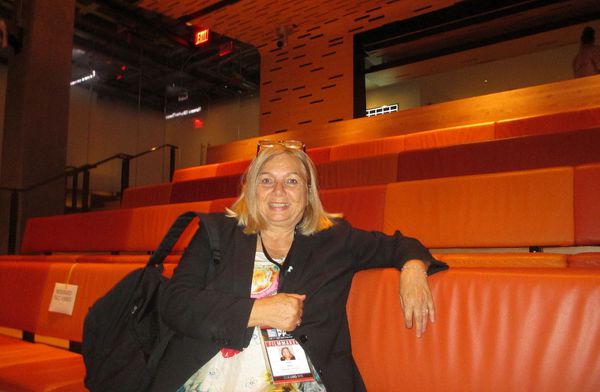 |
| Beloved Sisters producer Uschi Reich on Dominik Graf at the New York Film Festival: "It was very important for Dominik to work with the language." Photo: Anne-Katrin Titze |
Dominik Graf's Beloved Sisters (Die Geliebten Schwestern) starring Florian Stetter, Henriette Confurius and Hannah Herzsprung alongside Claudia Messner, Ronald Zehrfeld, Michael Wittenborn, Maja Maranow and Andreas Pietschmann, sharply re-invents the costume drama with an historical fiction centered around the ménage-à-trois love story between writer Friedrich Schiller (Stetter) and the sisters Caroline (Herzsprung) and Charlotte (Confurius) von Lengefeld.
I met up with producer Uschi Reich during the New York Film Festival to discuss her role in bringing the story to the screen. We also discussed Dominik Graf's voice and music, his relationship to Christian Kracht's novel Imperium and Frauke Finsterwalder's Finsterworld film, Caroline Link, the connection between Veit Heiduschka to Michael Haneke and Helge Sasse with Anton Corbijn's A Most Wanted Man creating a circle.
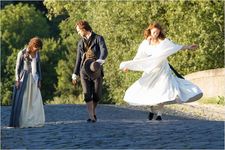 |
| Friedrich Schiller with Charlotte and Caroline von Lengefeld on the cobblestones |
In a film that is vast in scope and deals with private emotions, Graf throws us into the turmoil of the family's undertakings and understandings, the salons of Weimar and the sounds of the late 18th century heard with the ears of today.
In 1787, Charlotte von Lengefeld is sent to Weimar by her widowed mother Louise (Messner) to stay with her godmother, Frau von Stein (Maranow), who was madly in love and full of longing for Johann Wolfgang von Goethe, who at the time was off to Italy. Charlotte is charged with finding a rich husband, as her older sister Caroline did, who had married Friedrich von Beulwitz (Pietschmann) to help the family survive financially.
The social issues exposed never become a history lesson, academic pamphlet, or worst of all, a stodgy staged reenactment of the life and times of a German genius and his devoted family.
Anne-Katrin Titze: With Beloved Sisters (Die Geliebten Schwestern) you are re-inventing the costume drama in a way. How did the German audiences react to this time travel?
Uschi Reich: Very well. The film was very well received. Dominik and I never had such good reviews in our lives. We had a storm of good reviews and it was quite well received in the movie theatres. It opened in Germany now, in November it will open in Austria and Switzerland. We have sold the film over many countries. It's not a blockbuster but very successful in the art house genre.
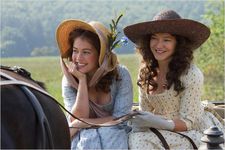 |
| Henriette Confurius and Hannah Herzsprung as the von Lengefeld sisters |
AKT: You have three different versions of Beloved Sisters. That is rare. What are the differences?
UR: Our version, Dominik and mine, was always this version, the one you have seen, the 170 minute one. This is our festival version. It was shown in different cinemas in Germany in this version, but the distributor wanted to have a shorter one. We discussed it a lot and finally Dominik did a shorter version of 140 minutes, which is two thirds of what is playing in German cinemas. One third is the longer version.
AKT: I've heard it is a different edit, not just shortened.
UR: It's the same version but it's re-edited. Only two scenes are cut shorter and the music is different.
AKT: The placement and choice of music was fascinating.
UR: That's Dominik.
AKT: He composed the music?
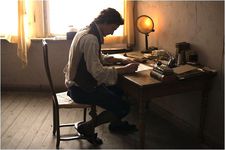 |
| Florian Stetter as Friedrich Schiller |
UR: Partly. He is always doing the music, he is always composing a little bit with the composer.
AKT: He does everything, doesn't he?
UR (with a laugh): Yes, yes, he does everything. The way he is working with music is very special. It's anti-climactic.
AKT: Sounds are placed like music, from the cobblestones to the pots and pans. Objects in general are very vivid and have a texture that you can almost feel.
Carriages on country roads, the chirping of summer birds and busy crickets, wooden floors and delicate cups - the quotidian racket articulates physical reality captured in material, suspended over centuries in the creaking of the parquet flooring.
UR: We worked on this a lot. The film is a quiet film. What we wanted to show was how the sounds of this time were, or how we think the sounds have been. It was very quiet and at the same time, everything was making very loud sounds. The horses, the coaches, everything was loud in a special way, the footsteps on the pavement. Many films about this time are very quiet or have artificial sound. We wanted to give the time a realistic sound.
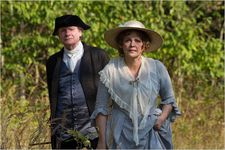 |
| Michael Wittenborn as Knebel with Claudia Messner as Louise von Lengefeld |
AKT: That is very interesting. Earlier today I spoke with Vanessa Lapa about her documentary on Heinrich Himmler, The Decent One, and I told her how much I liked the sound design, because she decided to give the archival footage a reality through sound. That is a good way to deal with the past. It's loud and it's there and it's present. You found a funny way to include Goethe in your story. First he is hovering above the events as absence in Italy, then you see him from behind, or get a bit of a Frankfurt accent. What were your thoughts behind Goethe as shadow?
UR: We were thinking a lot about what to do with Goethe because we thought we couldn't just take a German actor and pretend he is Goethe. That for us was impossible. So we decided to only show him in special ways - from behind. He was important at that time, politically, and also for Schiller and for his work. He was always The poet, the Minister, and a very rich man with a very beautiful house. Schiller always wanted to have a little bit of his success.
It's funny, when you go to Weimar, you can see the Schiller house and the Goethe house. They are very different. The Goethe house is like a big Italian house and the Schiller house is like a German house and it's very colourful. Goethe's is all yellow and white and in Schiller's you have blue, green, all the rooms are in different colors. It's a very funny, likable house and in a way it's more modern because it has an oven heating the whole house, with ducts into each room. It's a five minute walk between the two houses.
AKT: Schiller in Beloved Sisters has a card from Goethe on his desk with his Farbenlehre [Theory Of Colours] and one line written underneath. Is that an original letter?
UR: The line is not really underneath it but the picture of the Farbenlehre is very famous in Germany.
AKT: Earlier this summer, after I spoke with Frauke Finsterwalder and Christian Kracht about Finsterworld, they sent me a copy of their screenplay. It included a beautiful essay by Dominik Graf.
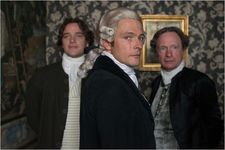 |
| Ronald Zehrfeld as Wilhelm von Wolzogen, Andreas Pietschmann as Friedrich von Beulwitz, and Michael Wittenborn as Knebel |
UR: Ah, yes, because he is a friend of Christian Kracht. He spoke an audio book from a script by Christian Kracht.
AKT: The novel Imperium, isn't it?
UR: Yes. Christian wanted that Dominik speaks it.
AKT: Because he is a wonderful speaker, which brings us back to Beloved Sisters.
UR: His father was a famous actor. He died quite young, sometime in the Fifties. Robert Graf was a very famous actor in the Fifties.
AKT: What kind of films was he in?
UR: Films about war. German films.
AKT: Do their voices sound similar?
UR: Yes.
AKT: The voices are very important in Beloved Sisters, the different voiceovers, the different levels of communication.
UR: It was very important for Dominik to work with the language. It's a film about language, too. He wanted to bring up the different levels. He is not using the original language of Schiller but he is close to it. He always tried to find a special rhythm. Also in his work with the actors, they had to speak it in a different way, a musical rhythm.
AKT: The language, as a result, doesn't have the feel of 1788, nor of 2014 either.
UR: That was our point of departure, that we didn't want to make a period piece, which is so period. All the characters in the story are so young. We also wanted to give a young and modern picture of these people.
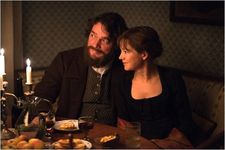 |
| Wilhelm von Wolzogen with Caroline von Lengefeld |
AKT: What was the impetus behind the choice of this subject matter, Schiller's time and to also speak about Germany today?
UR: I was making a film about the young Schiller in 2005. It was one of the first films of Matthias Schweighöfer, who was playing the young Schiller. This film tells the story about the time he was a young doctor in the army and he hated to be there. He began writing The Robbers and he quickly became a star and he had to leave his city and his country Baden-Württemberg where he was sued for revolt. He had to leave and he went to Mannheim and was working there at the theatre writing plays. He wrote Kabale und Liebe there. We were speaking about that yesterday but didn't know the English title.
AKT: Because there are quite a number of different titles. They never agreed on one translation, so it's Intrigue and Love or Love and Politics or some version like that.
UR: And he wrote some other plays. Schiller always had trouble with money and also with women. One day he decided to leave the theater and to go to Thuringia because he hoped to find rich people in Weimar, where the capitol of German culture was. He went to Weimar and met the family von Kalb, whom you see in the movie, too.
One day he was invited by Heinrich von Wolzogen to see his cousins. This is how he met the Lengefeld sisters. There is a lot of literature about this in Germany, but it is not known at all. I found it very interesting and after the first Schiller film, I tried to write a script with authors. We didn't come to a good ending, so I left it, but the story was always in my head.
AKT: So you were the spark for Dominik Graf to make this film?
UR: Yes. One day I had a young writer/director with me and I asked her, "what should I do? I love this story, do you think I should continue with these two authors?" Then we met the authors together and she was reading the script and told me, "oh no, throw it away. Start completely from scratch." That was good advice.
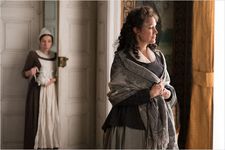 |
| Maja Maranow as Frau von Stein |
I was talking to [director] Caroline Link - they are not married, but she is living with Dominik - we did two films together and we know each other very well. I started to talk with her if she would like to do this subject. I know that Caroline doesn't want to tell about a character like Schiller, because she doesn't want to make a film about a genius. So she told me, maybe you should ask Dominik, he could be interested. It was the second try after five years. I made other films in the meantime.
AKT: You do a lot of children's movies, don't you?
UR: Yes, my main work is in children films, but in-between I always do art house films. I always felt I have to tell other stories, too. The children's films have all been very commercial.
AKT: I saw that one of your co-producers on Beloved Sisters was Helge Sasse, who recently did Anton Corbijn's A Most Wanted Man.
UR: He was also the distributor.
AKT: When he was still at Senator Film?
UR: Yes, still Senator. So he wanted to be a small co-producer. My main co-producer was Wega Film, Veit Heiduschka in Austria, who is the main producer of Michael Haneke. He produced all the films Michael Haneke did in Austria. When Haneke came to Germany or to France, he was also the co-producer. He is really responsible for the whole Haneke oeuvre. They are very close.
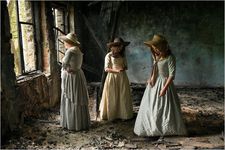 |
| Louise von Lengefeld with daughters Charlotte and Caroline in their house of ruins |
AKT: There is a jump in time at one point in connection to the Schiller house. It didn't feel artificial because you get the sense that the past and the present are living there simultaneously. Was that the thought behind it?
UR: Yes, it has still a relationship to today. Also the printing thing and the books. It was a brief idea when we were in Weimar to film the house with all the people coming. We didn't know in the beginning if he will use it. But we did. We were shooting there for several days and finally in the end everything came so well together. The story about the past and the present and the story about how books became bestsellers of the day and were sold in the world.
AKT: Books themselves as objects contain so much already. A few years ago, Sotheby's had a first edition of the Grimms' Kinder-Und Hausmärchen [Children's And Household Tales] from 1812. My hands were shaking when I was holding it in my hands, looking through it. That is what I was thinking about when in your film the passersby of today come around the corner.
UR: Also the ideas of Schiller that are still in the world. I like the scene very much. It's always a big discussion. Many people asked me why we did it and left it in the movie. We left it because we all loved it. It's funny with Dominik - he has a big vision of a film but he never follows a special pattern, like everything should be gray. When he likes a thing that is grey, then it's good. But he hates this concept art. He looks at what is going on and what comes to his mind, therefore he is doing such good work with the actors. Actors are really fantastic in each film he did. He is really watching out. Everything comes together in his person. That's why it's so interesting to work with him.
Beloved Sisters is Germany's noteworthy Oscar submission for Best Foreign Language Film at next year's Academy Awards. It will be released by Music Box Films on December 24 in the US.





















